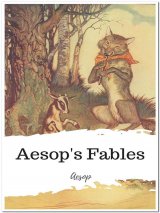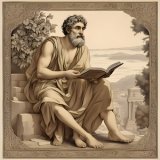Aesop's Fables Page #28
Aesop's Fables, or the Aesopica, is a collection of fables credited to Aesop, a slave and storyteller believed to have lived in ancient Greece between 620 and 564 BCE.
THE HORSE AND THE ASS A Horse, proud of his fine harness, met an Ass on the high-road. As the Ass with his heavy burden moved slowly out of the way to let him pass, the Horse cried out impatiently that he could hardly resist kicking him to make him move faster. The Ass held his peace, but did not forget the other's insolence. Not long afterwards the Horse became broken-winded, and was sold by his owner to a farmer. One day, as he was drawing a dung-cart, he met the Ass again, who in turn derided him and said, "Aha! you never thought to come to this, did you, you who were so proud! Where are all your gay trappings now?" THE DOG CHASING A WOLF A Dog was chasing a Wolf, and as he ran he thought what a fine fellow he was, and what strong legs he had, and how quickly they covered the ground. "Now, there's this Wolf," he said to himself, "what a poor creature he is: he's no match for me, and he knows it and so he runs away." But the Wolf looked round just then and said, "Don't you imagine I'm running away from you, my friend: it's your master I'm afraid of." GRIEF AND HIS DUE When Jupiter was assigning the various gods their privileges, it so happened that Grief was not present with the rest: but when all had received their share, he too entered and claimed his due. Jupiter was at a loss to know what to do, for there was nothing left for him. However, at last he decided that to him should belong the tears that are shed for the dead. Thus it is the same with Grief as it is with the other gods. The more devoutly men render to him his due, the more lavish is he of that which he has to bestow. It is not well, therefore, to mourn long for the departed; else Grief, whose sole pleasure is in such mourning, will be quick to send fresh cause for tears. THE HAWK, THE KITE, AND THE PIGEONS The Pigeons in a certain dovecote were persecuted by a Kite, who every now and then swooped down and carried off one of their number. So they invited a Hawk into the dovecote to defend them against their enemy. But they soon repented of their folly: for the Hawk killed more of them in a day than the Kite had done in a year. THE WOMAN AND THE FARMER A Woman, who had lately lost her husband, used to go every day to his grave and lament her loss. A Farmer, who was engaged in ploughing not far from the spot, set eyes upon the Woman and desired to have her for his wife: so he left his plough and came and sat by her side, and began to shed tears himself. She asked him why he wept; and he replied, "I have lately lost my wife, who was very dear to me, and tears ease my grief." "And I," said she, "have lost my husband." And so for a while they mourned in silence. Then he said, "Since you and I are in like case, shall we not do well to marry and live together? I shall take the place of your dead husband, and you, that of my dead wife." The Woman consented to the plan, which indeed seemed reasonable enough: and they dried their tears. Meanwhile, a thief had come and stolen the oxen which the Farmer had left with his plough. On discovering the theft, he beat his breast and loudly bewailed his loss. When the Woman heard his cries, she came and said, "Why, are you weeping still?" To which he replied, "Yes, and I mean it this time." PROMETHEUS AND THE MAKING OF MAN At the bidding of Jupiter, Prometheus set about the creation of Man and the other animals. Jupiter, seeing that Mankind, the only rational creatures, were far outnumbered by the irrational beasts, bade him redress the balance by turning some of the latter into men. Prometheus did as he was bidden, and this is the reason why some people have the forms of men but the souls of beasts. THE SWALLOW AND THE CROW A Swallow was once boasting to a Crow about her birth. "I was once a princess," said she, "the daughter of a King of Athens, but my husband used me cruelly, and cut out my tongue for a slight fault. Then, to protect me from further injury, I was turned by Juno into a bird." "You chatter quite enough as it is," said the Crow. "What you would have been like if you hadn't lost your tongue, I can't think." THE HUNTER AND THE HORSEMAN A Hunter went out after game, and succeeded in catching a hare, which he was carrying home with him when he met a man on horseback, who said to him, "You have had some sport I see, sir," and offered to buy it. The Hunter readily agreed; but the Horseman had no sooner got the hare in his hands than he set spurs to his horse and went off at full gallop. The Hunter ran after him for some little distance; but it soon dawned upon him that he had been tricked, and he gave up trying to overtake the Horseman, and, to save his face, called after him as loud as he could, "All right, sir, all right, take your hare: it was meant all along as a present." THE GOATHERD AND THE WILD GOATS A Goatherd was tending his goats out at pasture when he saw a number of Wild Goats approach and mingle with his flock. At the end of the day he drove them home and put them all into the pen together. Next day the weather was so bad that he could not take them out as usual: so he kept them at home in the pen, and fed them there. He only gave his own goats enough food to keep them from starving, but he gave the Wild Goats as much as they could eat and more; for he was very anxious for them to stay, and he thought that if he fed them well they wouldn't want to leave him. When the weather improved, he took them all out to pasture again; but no sooner had they got near the hills than the Wild Goats broke away from the flock and scampered off. The Goatherd was very much disgusted at this, and roundly abused them for their ingratitude. "Rascals!" he cried, "to run away like that after the way I've treated you!" Hearing this, one of them turned round and said, "Oh, yes, you treated us all right--too well, in fact; it was just that that put us on our guard. If you treat newcomers like ourselves so much better than your own flock, it's more than likely that, if another lot of strange goats joined yours, we should then be neglected in favour of the last comers." THE NIGHTINGALE AND THE SWALLOW A Swallow, conversing with a Nightingale, advised her to quit the leafy coverts where she made her home, and to come and live with men, like herself, and nest under the shelter of their roofs. But the Nightingale replied, "Time was when I too, like yourself, lived among men: but the memory of the cruel wrongs I then suffered makes them hateful to me, and never again will I approach their dwellings." The scene of past sufferings revives painful memories. THE TRAVELLER AND FORTUNE A Traveller, exhausted with fatigue after a long journey, sank down at the very brink of a deep well and presently fell asleep. He was within an ace of falling in, when Dame Fortune appeared to him and touched him on the shoulder, cautioning him to move further away. "Wake up, good sir, I pray you," she said; "had you fallen into the well, the blame would have been thrown not on your own folly but on me, Fortune."
Translation
Translate and read this book in other languages:
Select another language:
- - Select -
- 简体中文 (Chinese - Simplified)
- 繁體中文 (Chinese - Traditional)
- Español (Spanish)
- Esperanto (Esperanto)
- 日本語 (Japanese)
- Português (Portuguese)
- Deutsch (German)
- العربية (Arabic)
- Français (French)
- Русский (Russian)
- ಕನ್ನಡ (Kannada)
- 한국어 (Korean)
- עברית (Hebrew)
- Gaeilge (Irish)
- Українська (Ukrainian)
- اردو (Urdu)
- Magyar (Hungarian)
- मानक हिन्दी (Hindi)
- Indonesia (Indonesian)
- Italiano (Italian)
- தமிழ் (Tamil)
- Türkçe (Turkish)
- తెలుగు (Telugu)
- ภาษาไทย (Thai)
- Tiếng Việt (Vietnamese)
- Čeština (Czech)
- Polski (Polish)
- Bahasa Indonesia (Indonesian)
- Românește (Romanian)
- Nederlands (Dutch)
- Ελληνικά (Greek)
- Latinum (Latin)
- Svenska (Swedish)
- Dansk (Danish)
- Suomi (Finnish)
- فارسی (Persian)
- ייִדיש (Yiddish)
- հայերեն (Armenian)
- Norsk (Norwegian)
- English (English)
Citation
Use the citation below to add this book to your bibliography:
Style:MLAChicagoAPA
"Aesop's Fables Books." Literature.com. STANDS4 LLC, 2025. Web. 12 Jan. 2025. <https://www.literature.com/book/aesop%27s_fables_316>.




Discuss this Aesop's Fables book with the community:
Report Comment
We're doing our best to make sure our content is useful, accurate and safe.
If by any chance you spot an inappropriate comment while navigating through our website please use this form to let us know, and we'll take care of it shortly.
Attachment
You need to be logged in to favorite.
Log In